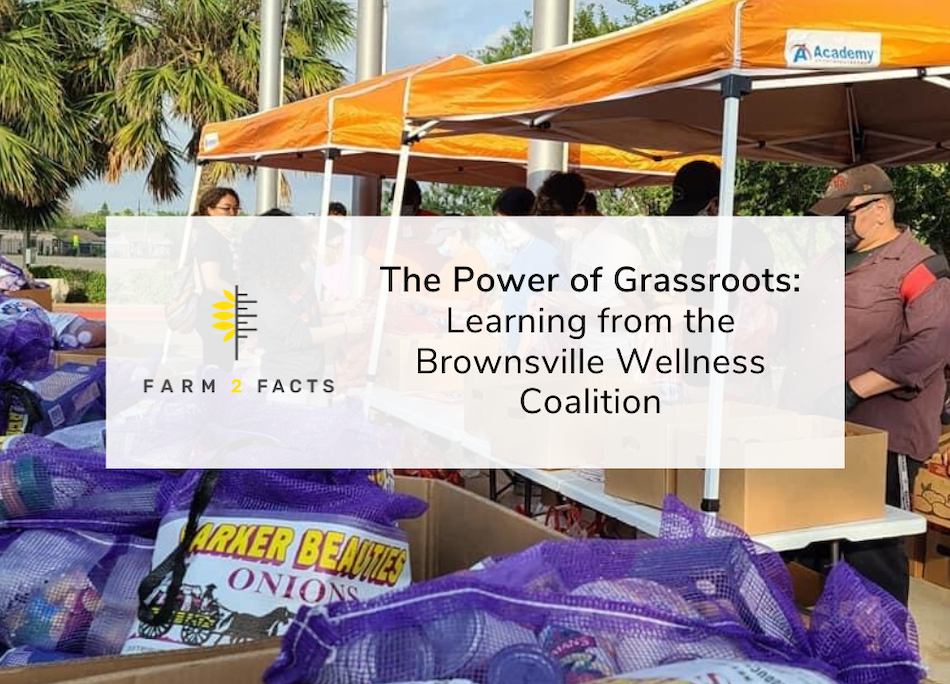
South Texas is an isolated rural area on the U.S.-Mexico Border. As an economically deprived region, the food security issues that have become even more clear during the current COVID-19 crisis are arguably magnified on the border. This economically distressed region is vulnerable to food supply chain disruptions. Even though South Texas is a traditional agricultural area with strong grassroots movements to champion health and wellness through food access, the current food insecurity systems in place lack coordination. This problem has not gone unseen, and The Brownsville Wellness Coalition (BWC) is a local non-profit organization that was created with goals to address its community’s poor health by providing programs that promote nutrition and healthy lifestyles.
A key entity with the BWC is the managing of the Brownsville Farmers Market (BFM), the largest year-round direct consumer-contact market in Cameron County. Like the entire U.S. border with Mexico, which has some of the worst health outcomes in the nation (Fisher- Hoch et al., 2015), Brownsville has an alarming, above-national prevalence of residents who are overweight (34%), obese (50%), and living with diabetes (28%) population. Furthermore, Brownsville, Texas, is one of the nation’s poorest cities, with over 31% of families living below the poverty level (ACS, 2019). BWC grew from a grassroots community response to the region health crisis and many organizations and individuals came together to plan for change including the University of Texas School of Public Health, Brownsville Regional Campus; the City of Brownsville (COB); and Su Clinica Familiar.
The mission of the BWC is to cultivate healthy food and lifestyles. To do so, it focuses on impacting the overall wellness in its community by:
- Strengthening the local food system
- Improving access to nutritious, affordable food
- Educating the public to produce, cook and eat healthy local food
- Promoting healthy lifestyle choices
- Providing opportunities to engage in physical activity
As a relatively young organization, the BWC has seen significant growth since its establishment in 2006. Like most non-profit organizations, the BWC relies on strategic partnerships and collaborations to address these strategic goals. Part of that effort culminated in the development of its 2019 Strategic Plan championed in partnership with other non-profit organizations and with the financial support of the Legacy Foundation.
The plan specifies four strategic goals:
- Ensure financial and organizational sustainability for the BWC
- Position the BWC as the acknowledged leader for wellness programs in the region
- Evaluate and strengthen programs to maximize impact and effectiveness
- Successfully move to new facilities.
Over the past few months, the BWC has been faced with the unforeseen impacts that the COVID-19 pandemic induced by straining the food access and distribution in the region. With social distancing ordinances in place, the BFM has shifted to an emergency distribution model with limited face-to-face interaction for farmers. In an effort to support local farmers, the BWC has prioritized vending local, fresh produce, while also expanding its operation to assist with free food distribution in the region.
A key issue that emerged out of the COVID-19 crisis is the need for strategic regional partnerships to address food distribution. To do this, the BWC partnered with entities such as the City of Brownsville, the Food Bank of the Rio Grande Valley, United Against Hunger among others. These partnerships allowed access for roughly 1,000 families every week for 10 weeks to free food distributions while the stay at home ordinance was in place. The effort was then expanded and distributions continue to take place in Brownsville weekly. The food distributed was and is possible through a combination of donations from the Food Bank and produce from local farmers originally targeted for sale at the market. As part of the emergency response for COVID-19, the BWC purchased produce from the farmers for the distribution.
We believe in the power of grassroots organizing and the model of strategic partnership championed by the BWC. Their model is one that can be replicated across communities in the U.S. and beyond for food security and wellness. Farmers markets play a vital role in connecting communities, and in this time of crisis, we can look to markets to champion a vision for a more sustainable and secure future.
